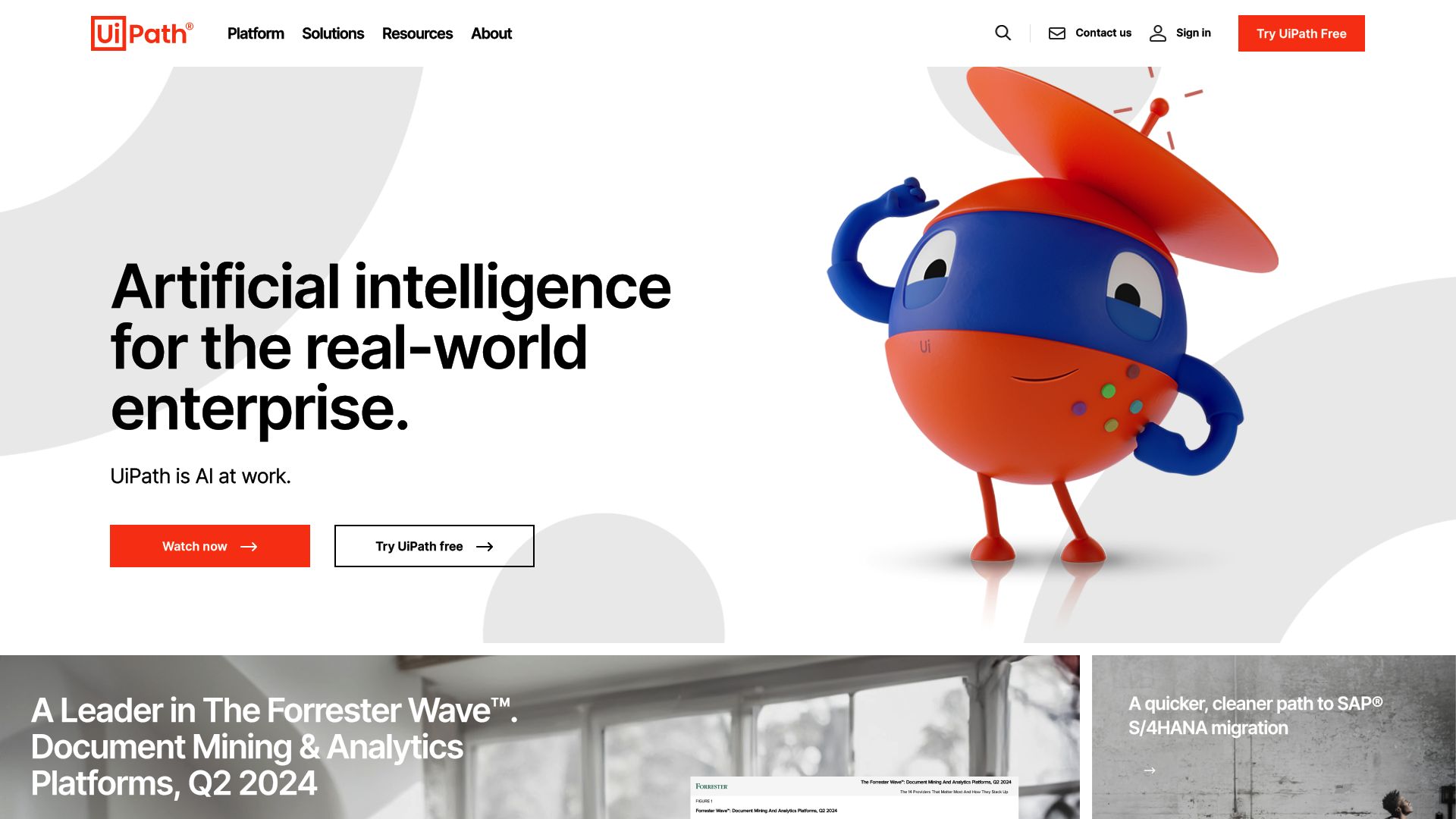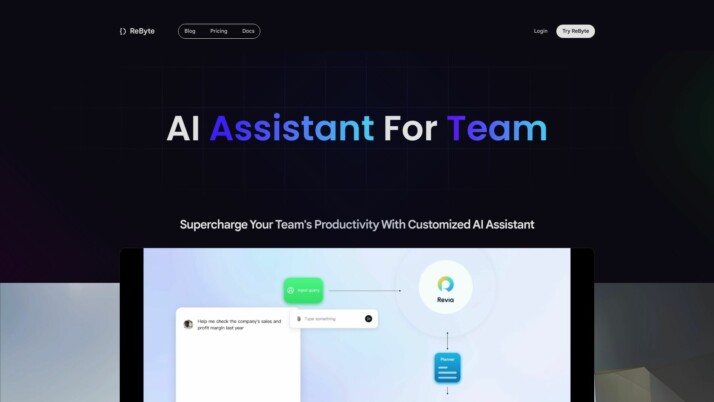UiPath vs. Rebyte: Choosing the Right AI Automation Platform
Artificial intelligence platforms are reshaping how businesses automate processes and build intelligent applications. This review compares three leading AI solutions: UiPath vs. Rebyte, and SmythOS. UiPath excels in robotic process automation for enterprises, while Rebyte focuses on rapid AI agent development with a no-code approach. SmythOS emerges as a comprehensive platform, combining enterprise-grade features with intuitive AI development tools. We’ll explore how each platform tackles automation, AI integration, and scalability to help you choose the best fit for your organization’s needs. Whether you’re a developer seeking advanced customization or a business user aiming for quick deployment, this comparison provides insights to guide your decision in leveraging AI for productivity and innovation.
UiPath Overview
UiPath revolutionizes business process automation with its comprehensive robotic process automation (RPA) platform. The company’s flagship product, UiPath Enterprise RPA Platform, empowers organizations to automate repetitive tasks and complex workflows across various industries.
UiPath revolutionizes business process automation with its comprehensive robotic process automation (RPA) platform.
UiPath offers a suite of tools designed to streamline automation development, deployment, and management. UiPath Studio provides a visual interface for creating automation workflows, making it accessible to both developers and business users. The platform’s AI Center integrates machine learning capabilities, enabling more intelligent and adaptive automations.


UiPath Orchestrator centralizes robot management, allowing organizations to scale their automation initiatives efficiently. This centralized control ensures governance, security, and compliance across the automation lifecycle. UiPath’s platform excels in handling structured data and predefined processes, making it ideal for industries like finance, healthcare, and manufacturing.
While UiPath offers powerful automation capabilities, it faces challenges in fully autonomous decision-making and handling unstructured data. The platform requires significant upfront investment in process mapping and configuration, which can be time-consuming for complex workflows. Additionally, UiPath’s focus on RPA may limit its applicability in scenarios requiring more advanced AI-driven problem-solving.
UiPath integrates with a wide range of enterprise systems and cloud services, facilitating seamless data exchange and process orchestration. The platform supports both on-premises and cloud deployments, providing flexibility for organizations with diverse IT infrastructures. UiPath’s extensive partner ecosystem and marketplace offer pre-built components and connectors, further extending its integration capabilities.
Rebyte Overview
Rebyte empowers users to rapidly develop AI-powered applications without extensive coding skills. The platform’s visual agent builder enables the creation of customizable AI agents with complex backend logic using large language models. Users can design fully customized interfaces for these agents without writing code, integrating private data sources seamlessly.
Rebyte’s serverless runtime handles hosting, orchestration, testing, and deployment of AI agents, streamlining the entire lifecycle from conception to production. The platform’s focus on end-user programming through AI democratizes the development of AI-powered tools, allowing knowledge workers and teams to automate workflows and boost productivity using no-code interfaces.
Rebyte empowers users to rapidly develop AI-powered applications without extensive coding skills. The platform’s visual agent builder enables the creation of customizable AI agents with complex backend logic using large language models.


Key features of Rebyte include detailed observability into every step of an agent’s process, facilitating transparency and debugging. The platform supports both development and production environments, enabling users to refine their agents before deployment. Rebyte’s integration capabilities allow connection to various data sources and APIs, expanding the potential applications of created agents.
Rebyte’s serverless runtime handles hosting, orchestration, testing, and deployment of AI agents, streamlining the entire lifecycle from conception to production.
While Rebyte offers significant advantages in rapid AI application development, it may face challenges in scaling for enterprise-level deployments. The platform’s focus on no-code solutions, while beneficial for accessibility, could potentially limit advanced customization options for highly specialized use cases. Additionally, as with many AI platforms, users should be mindful of data privacy and security considerations when integrating sensitive information.
Rebyte positions itself as a bridge between innovative AI technologies and practical business applications. Its approach aims to accelerate the adoption of AI solutions across various industries by reducing the technical barriers to entry. However, users should evaluate the platform’s long-term support and community resources to ensure sustained development and improvement of their AI applications.
Feature Comparison
UiPath and Rebyte offer distinct approaches to automation and AI agent development, each with its own strengths and limitations. UiPath excels in robotic process automation (RPA) with a comprehensive platform for automating structured business processes. Its visual builder and no-code options make it accessible for business users, while its orchestration capabilities enable enterprise-scale deployments. UiPath’s AI Center facilitates AI model integration, enhancing workflow intelligence.
Rebyte, on the other hand, focuses on rapid AI agent development without extensive coding. Its visual agent builder empowers users to create customizable AI agents with complex backend logic using large language models. Rebyte’s serverless runtime streamlines the hosting, testing, and deployment of AI agents, making it attractive for teams seeking quick AI application development.
A significant feature gap exists in autonomous agent capabilities. While UiPath’s robots follow predefined workflows, Rebyte’s agents offer more flexibility in handling unstructured tasks. UiPath’s strength lies in its robust enterprise features, including detailed audit logs and comprehensive security measures. Rebyte, however, may provide more agility in creating AI-powered applications that can adapt to dynamic scenarios.
Feature Comparison Table
| UiPath | Rebyte | SmythOS | |
|---|---|---|---|
| CORE FEATURES | |||
| AI Agents | ❌ | ✅ | ✅ |
| Hosted Agents (Dev, Production) | ❌ | ✅ | ✅ |
| No-Code Options | ❌ | ✅ | ✅ |
| Memory & Context | ❌ | ✅ | ✅ |
| Autonomous Agents | ❌ | ❌ | ✅ |
| Explainability & Transparency | ❌ | ✅ | ✅ |
| Multimodal | ❌ | ❌ | ✅ |
| Problem-Solving Capabilities | ❌ | ✅ | ✅ |
| Multi-Agent Collaboration | ❌ | ❌ | ✅ |
| Work as Team | ❌ | ✅ | ✅ |
| SECURITY | |||
| Constrained Alignment | ❌ | ❌ | ✅ |
| Data Encryption | ✅ | ❌ | ✅ |
| OAuth | ✅ | ❌ | ✅ |
| IP Control | ✅ | ❌ | ✅ |
| COMPONENTS | |||
| Foundation AIs | ❌ | ✅ | ✅ |
| Huggingface AIs | ❌ | ❌ | ✅ |
| Zapier APIs | ❌ | ✅ | ✅ |
| Classifiers | ❌ | ❌ | ✅ |
| Logic | ✅ | ❌ | ✅ |
| Data Lakes | ❌ | ❌ | ✅ |
| DEPLOYMENT OPTIONS (EMBODIMENTS) | |||
| Deploy as API | ❌ | ✅ | ✅ |
| Deploy as Webhook | ❌ | ❌ | ✅ |
| Staging Domains | ❌ | ❌ | ✅ |
| Production Domains | ❌ | ❌ | ✅ |
| API Authentication (OAuth + Key) | ✅ | ❌ | ✅ |
| Deploy as Site Chat | ❌ | ✅ | ✅ |
| Deploy as Scheduled Agent | ❌ | ❌ | ✅ |
| Deploy as GPT | ❌ | ✅ | ✅ |
| DATA LAKE SUPPORT | |||
| Hosted Vector Database | ❌ | ✅ | ✅ |
| Sitemap Crawler | ❌ | ❌ | ✅ |
| YouTube Transcript Crawler | ❌ | ❌ | ✅ |
| URL Crawler | ❌ | ❌ | ✅ |
| TXT File Support | ❌ | ✅ | ✅ |
Best Alternative to UiPath and Rebyte
SmythOS stands out as the superior alternative to UiPath and Rebyte, offering a comprehensive AI automation platform that addresses the limitations of both competitors. Our solution combines the best of both worlds: UiPath’s enterprise-grade capabilities and Rebyte’s focus on rapid AI agent development.
We provide a user-friendly drag-and-drop interface that surpasses UiPath’s visual builder, enabling users to create complex AI workflows without extensive coding knowledge. Unlike Rebyte’s limited deployment options, SmythOS offers versatile deployment choices, including APIs, webhooks, chatbots, and scheduled agents.
SmythOS stands out as the superior alternative to UiPath and Rebyte, offering a comprehensive AI automation platform that addresses the limitations of both competitors.
Our platform excels in autonomous agent capabilities, a critical feature gap in both UiPath and Rebyte. SmythOS agents can operate independently, adapting to dynamic scenarios and handling unstructured tasks with ease. This flexibility empowers businesses to automate a wider range of processes and tackle more complex challenges.
SmythOS also addresses the security concerns present in both competitors. We offer robust data encryption, OAuth integration, and IP control features, ensuring enterprise-grade security that matches or exceeds UiPath’s offerings while filling the gaps in Rebyte’s security measures.
With our extensive integration ecosystem, including support for various AI models, APIs, and data sources, SmythOS provides unparalleled versatility. We enable seamless connections to popular services like Slack, GitHub, and Stripe, as well as integration with cutting-edge AI models from providers like OpenAI and Hugging Face. This comprehensive approach allows users to create powerful, intelligent workflows that adapt to their specific business needs.
Conclusion
UiPath, Rebyte, and SmythOS each offer unique approaches to automation and AI development, catering to different needs and skill levels. UiPath excels in robotic process automation for enterprises, providing comprehensive tools for automating structured business processes. Rebyte focuses on rapid AI agent development with a no-code approach, making AI application creation accessible to a wider audience.
SmythOS, however, stands out as the superior choice, combining the best of both worlds. Its drag-and-drop interface rivals Rebyte’s ease of use, while its enterprise-grade features match UiPath’s scalability. SmythOS goes further by offering unparalleled flexibility in AI model integration, supporting over 300,000 integrations, and enabling deployment across various platforms.
What truly sets SmythOS apart is its vision for democratizing AI development. By making advanced AI capabilities accessible without extensive coding knowledge, SmythOS is poised to revolutionize how businesses leverage AI. Its support for autonomous agents, multi-agent collaboration, and problem-solving capabilities surpasses both UiPath and Rebyte, offering a more comprehensive solution for complex, dynamic tasks.
For those looking to harness the full potential of AI in their workflows, SmythOS is the clear choice. Whether you’re a developer seeking advanced customization or a business user aiming for quick deployment, SmythOS offers the tools and flexibility to meet your needs. Explore SmythOS’s diverse range of AI-powered agent templates to jumpstart your AI journey, or dive into the comprehensive documentation to understand the platform’s full capabilities. With SmythOS, you’re not just adopting a tool; you’re embracing the future of AI-powered productivity.
Last updated:
Disclaimer: The information presented in this article is for general informational purposes only and is provided as is. While we strive to keep the content up-to-date and accurate, we make no representations or warranties of any kind, express or implied, about the completeness, accuracy, reliability, suitability, or availability of the information contained in this article.
Any reliance you place on such information is strictly at your own risk. We reserve the right to make additions, deletions, or modifications to the contents of this article at any time without prior notice.
In no event will we be liable for any loss or damage including without limitation, indirect or consequential loss or damage, or any loss or damage whatsoever arising from loss of data, profits, or any other loss not specified herein arising out of, or in connection with, the use of this article.
Despite our best efforts, this article may contain oversights, errors, or omissions. If you notice any inaccuracies or have concerns about the content, please report them through our content feedback form. Your input helps us maintain the quality and reliability of our information.
